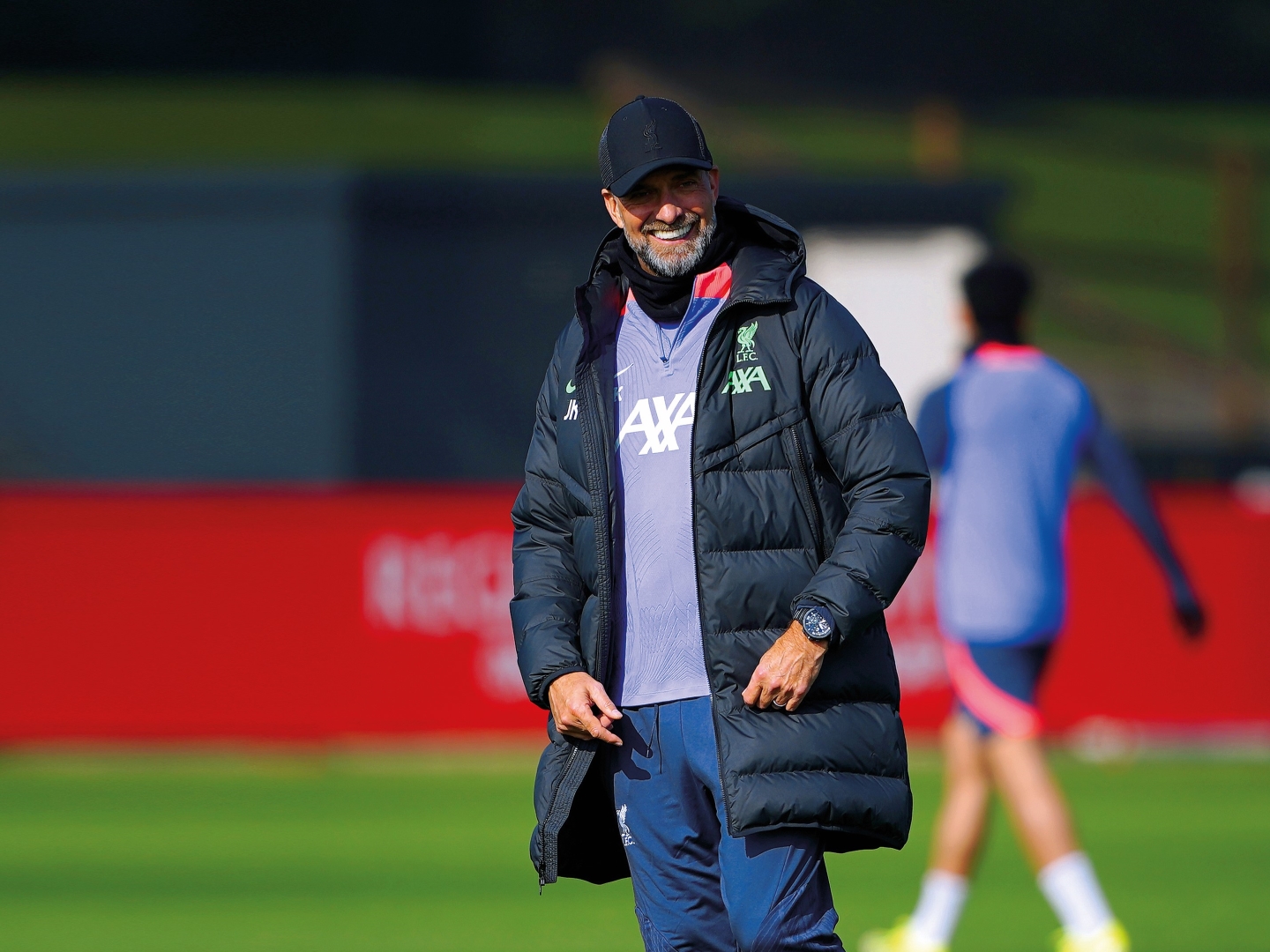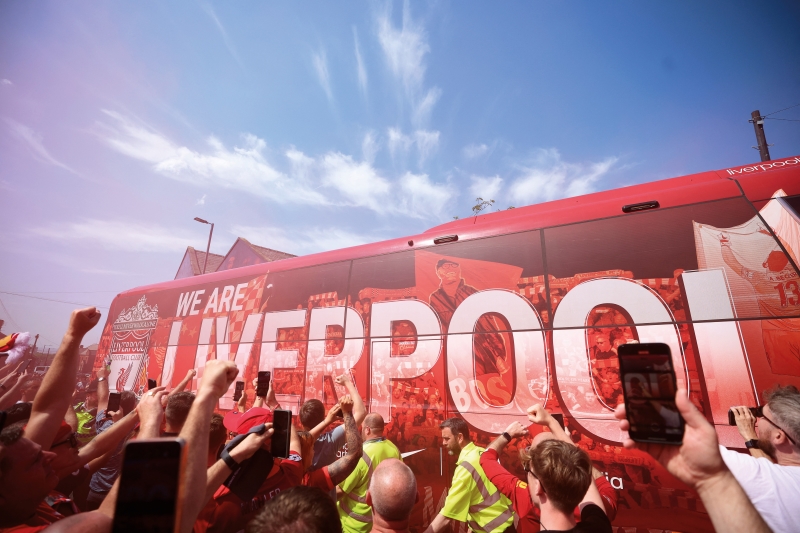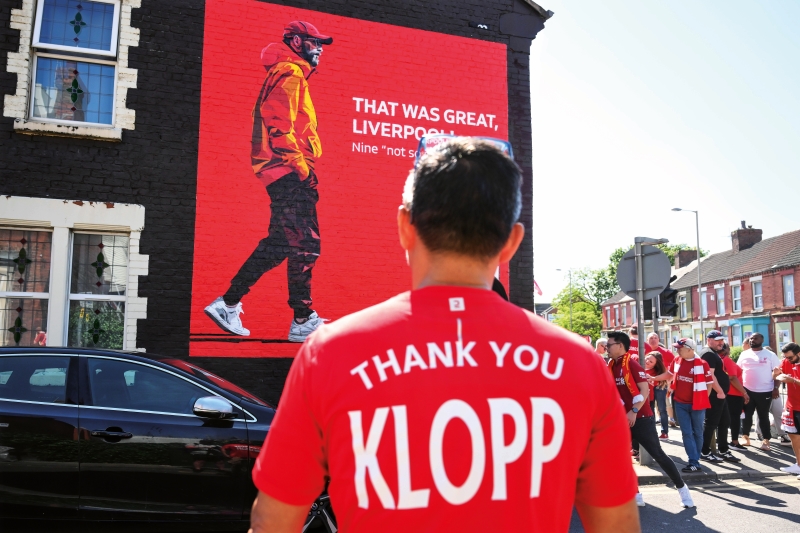
Klopp famously said, "If you want to succeed in the future, you must be ready to work now."(Photo: Reuters)
There are only superlatives to describe the legacy Jürgen Klopp leaves behind at Liverpool FC. If you have been following the club’s trajectory, you cannot deny how his charismatic style energised players, fans and the city alike.
I remember him saying in his very first interview as manager, “We have to change from doubter to believer”. And he bravely committed to winning a league title “within four years” despite Liverpool being title-less for 25 years.
This mindset shift was the pivotal point for the club to start believing again and adopting a champion’s mentality. And Klopp succeeded in doing so with his unique brand of leadership. We cannot forget his introduction of “heavy metal football” either, with the deep pressing and defending from the front, which changed the way Liverpool played.
Highs + lows
Personally, I would sum up his three highest points as follows: topping the Premier League after a 30-year gap with intense competition against teams with clearly deeper pockets; rebounding to clinch the Champions League in 2019 after the disappointment in Kiev in 2018; and successfully winning two of the most epic games ever, which are the 4-0 comeback victory against Barcelona in 2019 and the 7-0 thrashing of Manchester United in 2023.
Just as there were highs, inevitably, Liverpool had lows. For Klopp, this would include not getting the better of Real Madrid in the Champions League finals in 2018 and 2022; not finishing the 2021/22 season with the quadruple (the club missed out on the two big ones: the Premier League — by a single, measly point, it must be said — and the Champions League); and losing out on the quadruple yet again. The latter also meant, after such a great run, Klopp did not earn his grand farewell despite so much hope and promise following the announcement of his retirement. It appeared that the team had lost its momentum and could not close off the games despite being so dominant.
As an executive working in a tech multinational, there is much to learn from Klopp and I have taken the liberty to summarise some of the best lessons in 10 salient points.
2024-05-19t134208z_791070503_up1ek5j1226ve_rtrmadp_3_soccer-england-liv-wlv-report_1.jpg

Embrace the right mentality: As mentioned earlier, Klopp stressed having to change from doubter to believer. And he certainly did that in his nine years leading the club. What is important is that, in his farewell speech at Anfield, he reminded the players and the fans again, telling them to believe, emphasising the importance of not letting go of the believer mindset and continuing to do so with the new manager.
In life and at work, in order for us to be successful, we likewise need to start with a positive mindset. There will be many naysayers and obstacles along the way but if we stay true with a positive mindset, we can conquer mountains.
Clear vision and the right expectations: Klopp set the vision by committing to winning a league title but he was mindful not to overpromise and set the wrong expectations. He famously said, “It needs time. Nobody wants to hear it, but that’s the truth: If you want to succeed in the future, you must be ready to work now.”
As leaders, we too need to understand what is expected of us while taking stock of the team we inherit and fixing the right time frame for the achievement of objectives. Greatness cannot be achieved overnight.
Build the team by bridging present and future: Klopp did not do an immediate overhaul when he took over. Over the span of three years, he brought in Sadio Mane, Gini Wijnaldum and Joël Matip (2016); and Mo Salah, Andy Robertson, Alex Oxlade-Chamberlain and Virgil van Dijk (2017). He completed his team with Fabinho and Alisson Becker in 2019. Together with Jordan Henderson and Roberto Firmino (original players), they went on to win the Champions League and 2019/20 Premier League title.
In work, it is expected that a new leader will bring in his or her people. But it is also paramount to appreciate those who remain in the team as they bring strong institutional knowledge of the organisation which can complement the new blood. As we have seen, Klopp made Henderson and Firmino much better players under his wing and both were important cogs of the winning group.
2024-05-19t112332z_2135753852_mt1sipa000jqw8jy_rtrmadp_3_sipa-usa_1.jpg

Know when to stop: It is good to watch and listen to the video of when Klopp first announced his plan to step down. Clearly, only he is aware of what he is capable of delivering. As onlookers, we see him running at 200kph but we do not know what is left in his tank.
It is important to determine when to stop. In the office, we are all working on an infinite objective, especially if you are in a sales environment. The target or quota will only go up every year, so it is important to identify how much is left lest you find yourself running on empty.
Perform regardless: “Anyone can have a good day, but you have to be able to perform on a bad day” is another of Klopp’s quotable lines that is applicable in sport, work and life. Not every day will be good. Everyone can look good when the economy is doing well and bullish. True leaders are those who consistently perform well, especially during bad times.
Build a team stronger than the one you inherited: Klopp sums it up perfectly when he remarked how “it is not important what people think when you come in but what they think when you leave”.
After nine years, Klopp is departing, confident that he has successfully built a strong team for the years to come. Calling it Liverpool 2.0, he has taken young players from the Academy like 20-year-old Conor Bradley, 19-year-olds Bobby Clark and James McConnell, and 18-year-old Jayden Danns, have them play and win the Carabao final — a testimony to his mindset.
Likewise, it is always crucial for leaders to build the team by nurturing young talent in the organisation. In life, we should provide the right platform and environment for our kids to excel and achieve success in their eventual choice of career.
Lead with agility: A famous Klopp quote goes: “It’s not about having a philosophy. It’s about adapting to the quality of the opponent.” This is so true in football and our working life. With the world changing so quickly, we need to constantly apply different strategies to deal with different competitors. Staying with a single philosophy or approach makes us predictable and easy for them to read our game.
Be humble: When he first took on the role, Klopp referred to himself as “The Normal One”, in direct contrast to another well-known manager who called himself “The Special One”. This humility endeared him to fans and players alike, helping him build a strong connection with his team and key stakeholders, all of whom were vital during the challenging phases of transformation.
Life is too short not to celebrate nice moments: This is another of Klopp’s famous aphorisms that resonate very well with me. Life is indeed too short. We don’t know what tomorrow will bring, so we must live in the present and appreciate the good times. This includes celebrating all the wins, whether it is scoring a US$100 million order or a US$50,000 one. Every triumph is a reason for us to remember. In life, find every occasion to cherish our loved ones — not just on birthdays and anniversaries. Any reason is worth celebrating.
Embrace your successor: It was a class act when Klopp rallied the Anfield crowd during his farewell speech to sing, “Arne Slot … la-la, la-la-la.” This is certainly a great start for Slot, who obviously knows he has big shoes to fill.
In work, we too must realise that we are all interim leaders or managers. The time will come for us to pass the baton. So, embrace your successor and provide the support and advice to ensure he or she has all the help they need to take the team to the next level.
Given Klopp’s proven pedigree, there will doubtless be many teams — both club and country — that will want him. Based on his comments that there is “nothing more in his tank”, I personally would like to see him enjoy a well-deserved break away from the game, spend more time with his family and loved ones, and return refreshed … hopefully, to take on the challenge of dismantling Real Madrid’s grip on the Champions League.
This article first appeared on June 3, 2024 in The Edge Malaysia.


